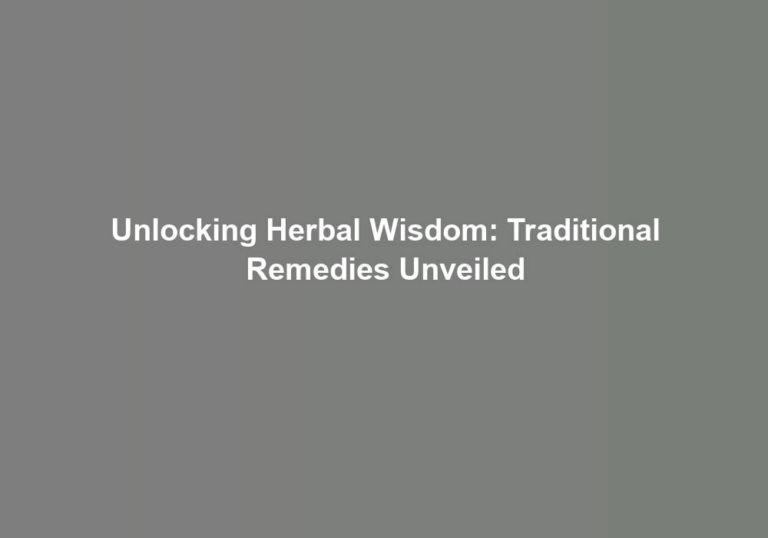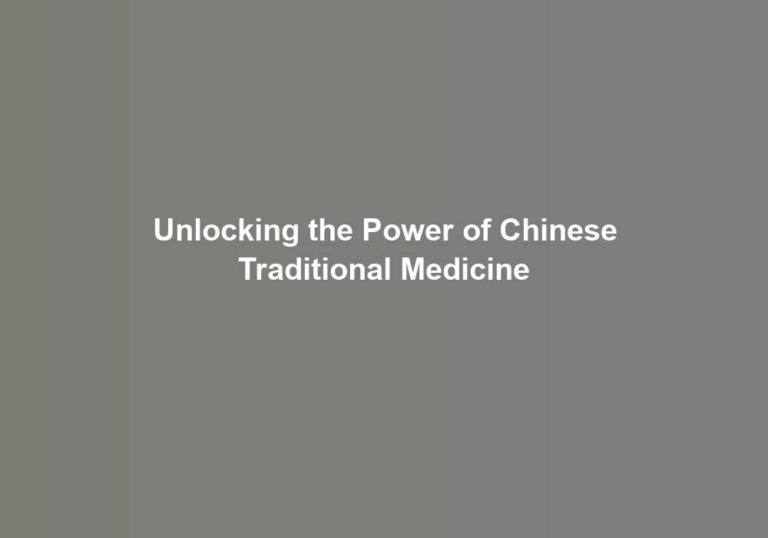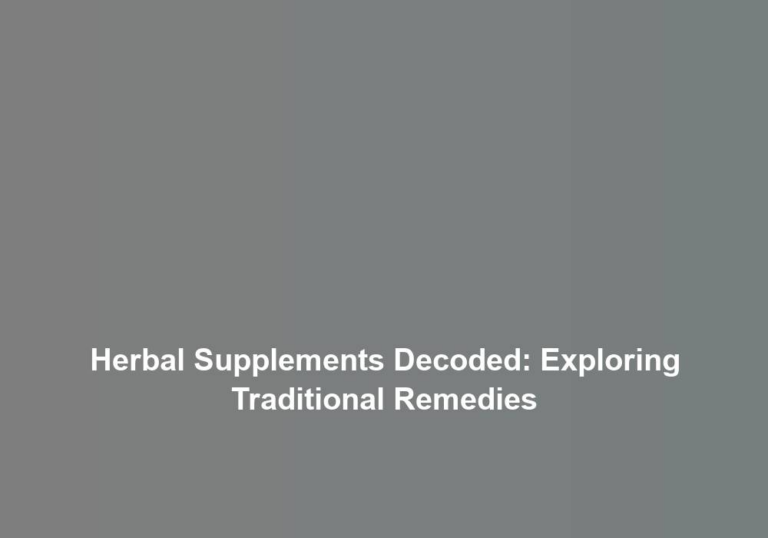Chinese Traditional Medicine Unveiled: Traditional Remedies
Step into the intricate tapestry of Chinese traditional medicine, where ancient wisdom intertwines with modern understanding. As you peel back the layers of history and tradition, youG??ll uncover a world of remedies that have stood the test of time. From acupunctureG??s delicate balance of energy to the potent healing properties of herbal medicine, each remedy offers a glimpse into the intricate web of Chinese healing practices. But thereG??s more to these traditional remedies than meets the eye – their principles and techniques hold the key to unlocking a holistic approach to health and well-being that has captivated the curiosity of many.
History of Chinese Traditional Medicine
In the ancient world of China, traditional medicine has been an integral part of peopleG??s lives, shaping their understanding of health and wellness for thousands of years. The history of Chinese traditional medicine is deeply rooted in the countryG??s rich cultural heritage, dating back to ancient times. Traditional remedies have been passed down through generations, carrying with them the wisdom of centuries. This history is not just a chronicle of medical practices but a testament to the cultural significance of traditional medicine in China.
The history of Chinese traditional medicine is a tapestry woven with the threads of ancient beliefs, holistic healing, and herbal remedies. It reflects a time when people lived in harmony with nature, relying on the healing power of plants and natural elements to restore balance and well-being. The cultural significance of these practices lies in their ability to connect individuals to their heritage, fostering a sense of belonging and continuity with the past.
Over the centuries, Chinese traditional medicine has evolved, adapting to the changing needs of society while staying true to its roots. The history of this medicine is a testament to its resilience and enduring relevance. It serves as a source of pride and identity for the Chinese people, reaffirming their place in a lineage of ancient wisdom and healing traditions. Embracing the history and cultural significance of Chinese traditional medicine offers a profound sense of belonging and connection to a heritage that spans millennia.
Principles of Traditional Remedies
As you explore the principles of traditional remedies in Chinese Traditional Medicine, you will discover the profound wisdom of herbal medicine and its intricate connection to nature. Embracing the concept of Yin and Yang balance, traditional remedies aim to restore harmony within the body, mind, and spirit. This ancient approach to healing embodies a holistic perspective, emphasizing the interconnectedness of all aspects of health and wellness.
Herbal Medicine Principles
Understanding the principles of herbal medicine involves embracing the wisdom of ancient healing traditions and the inherent power of natural remedies. This holistic approach to healing is deeply rooted in the belief that the body, mind, and spirit are interconnected. When delving into herbal medicine principles, itG??s essential to recognize the following:
- Balance: Herbal medicine practices aim to restore harmony within the body, addressing the root cause of ailments rather than just alleviating symptoms.
- Individuality: Traditional healing techniques consider each personG??s unique constitution and tailor remedies to their specific needs.
- Energetics: Herbs are categorized based on their energetic properties, such as cooling or warming, to rebalance the bodyG??s energy.
- Integration: Herbal remedies are often integrated with other healing modalities to support overall well-being and vitality.
Yin and Yang Balance
Embracing the ancient wisdom of Chinese traditional medicine, the balance of yin and yang is fundamental to the principles of traditional remedies, guiding the holistic approach to healing and restoring harmony within the body. Traditional healing techniques emphasize the importance of maintaining the delicate equilibrium between yin and yang energies. When these forces are in balance, the body is believed to be in a state of optimal health. Traditional remedies, such as acupuncture and herbal medicine, aim to restore this balance by addressing the underlying disharmony. For example, cooling yin herbs are used to counteract excessive yang energy, while warming yang herbs can restore balance when yin is deficient. By understanding and nurturing the interplay of yin and yang, traditional Chinese medicine offers a path to holistic wellness and a sense of belonging within the natural order.
Holistic Health Approach
In the holistic approach of traditional remedies, the interconnectedness of the body, mind, and spirit is central to achieving optimal wellness and balance. Embracing the mind-body connection and natural healing is fundamental to this ancient wellness approach. Here are essential principles to guide you on this holistic journey:
- Balance: Seek harmony between your physical, mental, and spiritual aspects.
- Integrative Medicine: Embrace a comprehensive approach that combines traditional remedies with modern healthcare practices.
- Wholeness: Recognize that your well-being is interconnected with the world around you.
- Self-awareness: Cultivate mindfulness and self-reflection to nurture your holistic health.
Acupuncture: Ancient Healing Technique
Acupuncture, an ancient healing technique rooted in Chinese traditional medicine, involves the insertion of thin needles into specific points on the body to restore balance and promote overall wellness. The benefits of acupuncture are manifold, encompassing not only physical health but also mental and emotional well-being. By stimulating these specific points, acupuncture can help alleviate pain, reduce stress, boost energy levels, and enhance the bodyG??s natural healing abilities. The techniques employed in acupuncture vary, with practitioners using different needle insertion depths, techniques such as gentle twirling or heat application, and sometimes combining it with other traditional Chinese therapies like cupping or herbal medicine to optimize the effects.
The wisdom of acupuncture lies in its ability to address the root cause of ailments, rather than just alleviating symptoms. It views the body as a holistic entity, interconnected and in constant interaction with the environment. By harmonizing the flow of vital energy, or Qi, through the bodyG??s meridians, acupuncture seeks to restore balance and support the bodyG??s innate capacity for self-healing. This ancient healing technique offers a sense of belonging to a tradition that has withstood the test of time, fostering a connection to generations of healers who have practiced and refined these techniques over centuries. Whether used as a standalone treatment or in conjunction with other traditional remedies, acupuncture has the potential to offer profound benefits for those seeking a natural and holistic approach to health and wellness.
Herbal Medicine: NatureG??s Remedies
Embrace the power of herbal medicine, as it offers a natural approach to healing and wellness. Plants have been used for centuries to address various health concerns, providing a time-tested method for restoring balance and vitality to the body. Discover the effectiveness of traditional remedies and the benefits of plant-based healing in herbal medicine.
Herbal Medicine Benefits
Nourish your body and soul with the natural healing power of herbal remedies in Chinese Traditional Medicine. Embrace the benefits of herbal medicine, passed down through generations, to support your overall well-being. Discover the wisdom of ancient herbal practices and unlock the potential for vitality and balance.
- Harmonize: Herbal remedies aim to harmonize the body, mind, and spirit, promoting holistic wellness.
- Balance: They work to restore balance within the body, addressing the root cause of ailments.
- Strengthen: Herbal medicine can strengthen the immune system, providing resilience against illness.
- Revitalize: Experience the revitalizing effects of herbal remedies, rejuvenating your energy and vitality.
Through ongoing herbal medicine research and traditional remedy applications, the profound benefits of herbal medicine continue to be unveiled, offering you a sense of belonging to the natural world and its healing wonders.
Plant-Based Healing
Unlock the secrets of natureG??s healing power with plant-based remedies, harnessing the ancient wisdom of herbal medicine in Chinese Traditional Medicine. Embrace the nourishing essence of a plant-based diet, as it aligns harmoniously with the bodyG??s natural rhythms, promoting vitality and balance. Healing herbs, such as ginseng, ginger, and goji berries, hold the key to restoring your bodyG??s equilibrium and fortifying its innate healing abilities. These herbs have been revered for centuries for their profound effects on well-being, offering a holistic approach to health and vitality. Incorporating healing herbs into your daily routine can provide a sense of connection with nature and ancient traditions, fostering a profound sense of belonging within the natural world. Embrace the wisdom of plant-based healing to nourish your body, mind, and spirit.
Traditional Remedy Effectiveness
Harness the ancient wisdom of herbal medicine in Chinese Traditional Medicine by exploring the effectiveness of traditional remedies derived from natureG??s healing power. Traditional remedy research and cultural practices have shown the effectiveness of these natural remedies in treating various ailments. Here are some key aspects to consider:
-
Holistic Approach: Traditional remedies take a holistic approach to healing, considering the interconnectedness of the body, mind, and spirit.
-
Herbal Formulations: Herbal medicine utilizes combinations of natural ingredients to create powerful formulations that have been refined over centuries.
-
Personalized Treatments: Traditional remedies are often tailored to individual needs, taking into account unique body constitutions and health conditions.
-
Time-Tested Wisdom: These remedies have stood the test of time, with many formulations being passed down through generations, showcasing their enduring effectiveness.
Cupping Therapy: Holistic Healing Approach
Cupping therapy, an ancient healing practice, involves creating suction on the skin to promote blood flow and relieve tension, aligning with the holistic principles of Chinese Traditional Medicine. This holistic wellness approach is rooted in the belief that imbalances in the body lead to ailments, and cupping aims to restore balance and promote healing. The therapy is often used in combination with other alternative medicine practices such as acupuncture and herbal remedies.
| Holistic Wellness | Alternative Medicine | Ancient Healing |
|---|---|---|
| Balancing the bodyG??s energy flow | Complementing acupuncture | Traces back to ancient times |
| Emphasizing overall well-being | Utilizing natural remedies | Linked to traditional Chinese medicine |
| Focusing on mind-body connection | Enhancing the bodyG??s natural healing abilities | Valued for its time-tested effectiveness |
These holistic methods of healing are deeply intertwined with nature and the bodyG??s innate wisdom. By embracing cupping therapy, you are embracing a tradition that has withstood the test of time, offering a sense of belonging to a community of individuals seeking natural, ancient healing practices. The use of cupping therapy not only addresses physical ailments but also nurtures a sense of connection to the traditions of Chinese Traditional Medicine, providing a comprehensive approach to wellness.
Qi Gong and Tai Chi: Mind-Body Practices
Flowing seamlessly from the holistic healing approach of cupping therapy, we now turn our focus to the ancient mind-body practices of Qi Gong and Tai Chi. These mindfulness practices are deeply rooted in the concept of energy flow techniques, aiming to harmonize the mind, body, and spirit. HereG??s what you need to know:
-
Qi Gong: This ancient Chinese practice emphasizes slow, deliberate movements, mindful breathing, and meditation to cultivate and balance the bodyG??s vital energy, known as G??Qi.G?? Qi Gong promotes the flow of energy throughout the body, enhancing overall well-being and fostering a deep sense of inner peace.
-
Tai Chi: Often referred to as G??meditation in motion,G?? Tai Chi involves a series of gentle, flowing movements and deep breathing. This practice focuses on achieving mental clarity, physical balance, and emotional harmony. By engaging in Tai Chi, individuals can experience improved flexibility, reduced stress, and increased vitality.
-
Mindfulness Practices: Both Qi Gong and Tai Chi encourage a heightened sense of self-awareness and presence in the current moment. Through these practices, individuals can develop a deeper connection between their physical, mental, and emotional states, promoting a more balanced and integrated approach to life.
-
Energy Flow Techniques: Central to Qi Gong and Tai Chi is the belief in the bodyG??s energy channels and the importance of maintaining a smooth flow of energy. These practices aim to remove blockages within the bodyG??s energy pathways, allowing for enhanced vitality and a greater sense of vitality.
Engaging in Qi Gong and Tai Chi can offer a profound sense of belonging to a timeless tradition, fostering a deep connection to both the self and the ancient wisdom of Chinese traditional medicine.
Conclusion
As you journey through the world of Chinese traditional medicine, you will discover a treasure trove of ancient remedies, each one a delicate flower blooming in the garden of holistic healing. Just as the roots of a tree draw nourishment from the earth, these time-honored practices draw upon the wisdom of nature to nourish the body and soul. Embrace the power of ancient remedies and let the healing energy flow through you like a gentle breeze through a forest of ancient wisdom.







